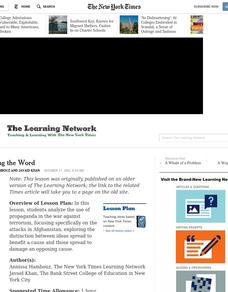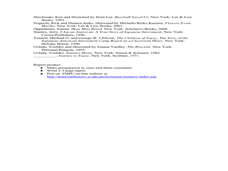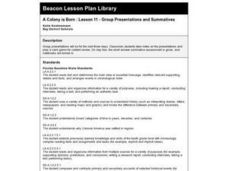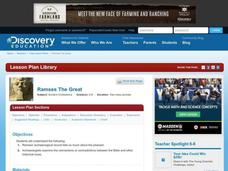National Endowment for the Humanities
How "Grand" and "Allied" Was the Grand Alliance?
Learn more about the Grand Alliance with a scaffolded lesson plan that includes four activities. Class members use primary sources to complete a map exercise, understand the goals and objectives of each individual nation, and participate...
National Endowment for the Humanities
Victory and the New Order in Europe
A New Order in Europe calls for a new lesson plan! This third plan in a series of four sequential lessons encourages high schoolers to read primary sources about the development of the New Order and follow up their knowledge with a...
Curated OER
Building Suburbia: Highways and Housing in Postwar America
Students determine how suburbs changed America. In this post World War II lesson, students complete research projects that require them to examine the growth of suburbs in the 1950's and 1960's. Students reveal how government policies,...
Curated OER
Spreading the Word
Students analyze the use of propaganda in the war against terrorism, focusing specifically on the attacks in Afghanistan, exploring the distinction between ideas spread to benefit a cause and those spread to damage an opposing cause.
National Endowment for the Humanities
The House Un-American Activities Committee
Was the House Un-American Activities Committee justified in investigating subversive influences in the entertainment industry? Part two of the three-part series of lessons that examine the anti-communism movement after World War II,...
Curated OER
People in History- Anne Frank
Students examine discrimination and what it was like during WWII and today. For this writing and analyzing lesson, students read pasages from Anne Frank's diary and find connections between Anne's life and the life of people in our...
Media Education Lab
Propaganda in Context
"Board Game Helps Fight Real World Ebola," a video produced by Voice of America, provides the text for a guided instructional activity that asks viewers to analyze the propaganda techniques used in the video. Groups then select a example...
Japan Society
Popular Culture and Japan’s Gross National Cool
From Manga to Godzilla and Pokemon, Japanese pop culture has been taking the globe by storm. This phenomenon is called "soft power." Learners will examine the differences between hard and soft power, as well as learn the historical and...
Curated OER
Lesson III: Crisis, Pearl Harbor, Internment
The third in a series of lessons introduced by “A Fence Away From Freedom,” uses the Smithsonian website, “A More Perfect Union: Japanese Americans and the U.S. Constitution” and focuses on the section of the presentation devoted to the...
Curated OER
Examining the Reasons for the Creation of the State of Israel
High schoolers explore the connection between World War II and Jewish immigration to Israel after the War. In this World History instructional activity, students discuss the details of what it might have been like to live through the...
Curated OER
A Colony is Born : Lesson 4 - What Went Wrong?
Fifth graders compare and contrast two early colonies and make a T chart. They list examples of worked well and what did not, and significant historical events. They use higher order thinking skills by deducing how different scenarios...
Curated OER
A Colony is Born : Lesson 11 - Group Presentations and Summatives
Fifth graders give presentations on colonial research. The others take notes on the presentations. They play a card game which helps them review content. They take a summative assessment and present their research notebooks.
Curated OER
Dr. Seuss Takes on Charles Lindbergh
Students study the leaders of the isolationist movement within the United States and the causes of the isolationist movement, they recognize and compare the perceptions of both the isolationists within the US and those who took a more...
Curated OER
Noncombatancy and the Seventh day Adventist Church
Upper graders investigate how the Seventh Day Adventists are objectors to the practice of war. The lesson plan covers the Civil War and examines the church's position about the practice of war. The research extends to modern wars and...
Curated OER
The Red Scare
Students identify and interpret issues of Nativism and Protectionism in early 20th Century America. They analyze the roots of anti-immigrant movements in the Post-World War One United States. Finally, students identify and explore the...
Curated OER
The Black Death and HIV/AIDS: Which is the Worse Plague?
Exploring the similarities and differences between the Black Death and HIV/AIDS, students write persuasive essays answering which is the "worse plague." This cross-curricular activity between Language Arts and Social Studies addresses...
Curated OER
Geography/Current Events Project
Using the Balkan region as an example, fourth graders review the five themes of geography as a class. They identify the physical and human characteristics of a region before labeling the countries and landforms on a map. They then...
Curated OER
Ramses The Great
Students investigate the statue that memorialized Ramses II. In this world monuments instructional activity, students research national and local monuments to find out if there are any controversies regarding their construction. Students...
National Endowment for the Humanities
Revolution '67, Lesson 2: What Happened in July 1967? How Do We Know?
Even in a world in which dozens of participants and curious onlookers record every controversial event, the basic facts of what happened are often in dispute. Revolution '67, Lesson 2 explores 1967 Newark, New Jersey using an examination...
The New York Times
Revolt! Comparing Historical Revolutions
What elements are needed to have a revolution? How do historical revolutions from across the globe and generations compare with one another? This is an excellent activity that incorporates group work, source analysis, and an engaging...
Curated OER
Our Small World
Students explore indigenous and Native cultures, and promote appreciation for the contributions from these cultures. They explore the concept of cultural conservation and gain more understanding about the issues that tribes face today. ...
Curated OER
Breaching the Gulf Between Cultures
Learners study the dynamics, the challenges, and the rewards of adjusting to a new culture, as illustrated by the author's account of his father's coming to terms with Sri Lankan customs. They reach the enduring understanding, "It is...
Curated OER
Why Is North Korea Going At It Alone?
Students examine the division of North and South Korea. They identify the ideological differences and the tensions between the two countries. They discuss the threat of nuclear weapons as well.
University of Southern California
Persecution of the German-Jews: The Early Years - 1933-1939
Young historians learn about the dehumanization process of stripping German Jews of basic, fundamental rights prior to the genocide of European Jews in the 1940s. Learners watch video clips of survivors who recount such events as the...

























